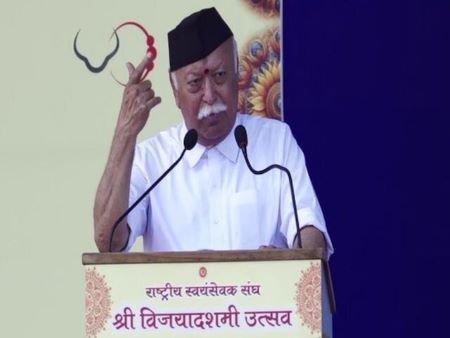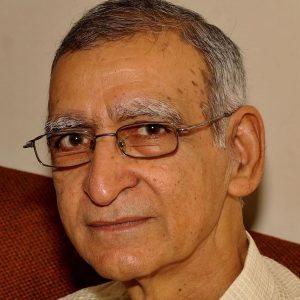ON OCTOBER 12, 2024, during the Vijayadashmi (Dussehra) celebrations, which mark the foundation day of the RSS, RSS Chief (Sarsanghchalak) Dr. Mohan Bhagwat delivered a speech. This address followed a significant speech he gave after the BJP’s loss in the 2024 General Elections.
In that speech, Bhagwat had criticized Narendra Modi, who had previously claimed he is a “non-biological” entity sent by God. As BJP’s seats fell from 303 to 240, Bhagwat remarked, “A man wants to be a superman, then a dev (deity), then a Bhagwan (God).”
 This election also marked the first time BJP claimed it was no longer reliant on RSS support due to its own capabilities.
This election also marked the first time BJP claimed it was no longer reliant on RSS support due to its own capabilities.
Through this speech, Bhagwat attempted to curb the growing arrogance of Narendra Modi. The RSS, or Sangh Parivar, then became hyperactive in the Haryana elections, and with the Election Commission’s favourable interventions, BJP defied expectations, securing power despite Congress’s perceived lead.
In his latest Dussehra speech, Bhagwat restated many of BJP’s policies, criticized non-BJP-ruled states, and outlined the deeper goals of the RSS and the essence of Hindutva politics. He declared, “Words like ‘Deep State,’ ‘Wokeism,’ ‘Cultural Marxism’ are enemies of all cultural traditions.
Their modus operandi is to first bring educational institutions under their influence. They then attempt to dismantle the thoughts, values, and beliefs of society, artificially create issues, and instill a sense of victimhood.

Mohan Bhagwat
Discontent grows, leading people to become aggressive, fostering anarchy, and instilling fear and hatred towards the system and governance, making it easier to dominate that country.”
The term “wokeism,” used here pejoratively, generally refers to “the awareness and concern for social and political injustices.” This, according to Bhagwat, was the speech’s core message. Hindu right-wing forces have significantly influenced social and political discourse.
Through shakhas, schools like Saraswati Shishu Mandir and Ekal Vidyalayas, and their extensive network, RSS has shaped social conservatism and reinforced caste and gender hierarchies. Recently, with media support from sympathetic corporations and BJP’s IT cells, Hindu nationalist ideologies have been further entrenched in public thought.
So, what does “wokeism” represent? It signifies a desire for a just society, opposing discrimination based on caste, religion, color, language, and supporting LGBT rights. Such rights for equality threaten Brahminical values, the foundation of Hindu nationalist politics. Right-wing political movements rooted in religious ideologies—such as the Taliban, the Muslim Brotherhood, and Buddhist-aligned politics in Sri Lanka and Myanmar—also foster inequality, albeit in different ways depending on local contexts.

Manusmriti
The founders of Hindu nationalist ideology exalted the Manusmriti for its subjugation of Dalits and women, viewing Muslims and Christians as foreigners. The RSS covertly supported the 1984 Sikh genocide, while right-wing politics views wokeism as antagonistic because it advocates equality—the goal of most social justice movements. Democracy aligns with the aspirations of these marginalized movements.
While Dalit, women’s, and LGBT movements are opposed by Hindu nationalists in India, women remain primary targets in Muslim-majority countries with fundamentalist regimes.
The RSS seeks to replace values of equality with those of an idealized, ancient “Golden Age,” rooted in inequality. The term “wokeism” is thus employed by RSS ideologues to denounce movements supporting the rights of the marginalized.
While RSS-BJP dynamics are internal, their fundamental values remain aligned despite ego clashes. Bhagwat’s criticism of non-BJP states reflects BJP’s stance. He remarked, “Today, Punjab, Jammu-Kashmir, Ladakh on the north-western border; Kerala, Tamil Nadu on the sea border; and the entire Purvanchal from Bihar to Manipur are disturbed.” His inclusion of Ladakh and Manipur in the same category is telling.
 Manipur has endured severe violence, particularly against Kuki women, with BJP’s apathy deeply concerning. In Ladakh, environmental preservation and the fight for equal citizenship are causes worth celebrating.
Manipur has endured severe violence, particularly against Kuki women, with BJP’s apathy deeply concerning. In Ladakh, environmental preservation and the fight for equal citizenship are causes worth celebrating.
Sonam Wangchuk’s remarkable leadership in Ladakh’s peaceful struggle will be remembered in history, yet BJP’s disregard for the movement casts a dark shadow over India’s contemporary history.
Bhagwat’s failure to address the R.G. Kar Medical College tragedy or the atrocities against women wrestlers and Dalit girls is notably partisan. Previously, he had claimed that rapes occur only in “India” (urban areas) and not in “Bharat” (villages), yet many such incidents in BJP-ruled states have occurred in villages or small towns.
A Ministry of Social Justice and Empowerment report indicates a troubling trend, with Uttar Pradesh recording 12,287 reported cases, followed by Rajasthan with 8,651, and Madhya Pradesh with 7,732 cases of atrocities against Dalits in 2022.
The most striking part of Bhagwat’s speech was his call for Hindu unity and strength, arguing that the weak cannot defend themselves. But are we not already united as Indians? Is there any lack of unity as defined by the Indian Constitution? Expecting otherwise from Bhagwat would be illogical, as his faith in the Constitution appears merely performative for electoral gains. ![]()
Disclaimer : PunjabTodayNews.com and other platforms of the Punjab Today group strive to include views and opinions from across the entire spectrum, but by no means do we agree with everything we publish. Our efforts and editorial choices consistently underscore our authors’ right to the freedom of speech. However, it should be clear to all readers that individual authors are responsible for the information, ideas or opinions in their articles, and very often, these do not reflect the views of PunjabTodayNews.com or other platforms of the group. Punjab Today does not assume any responsibility or liability for the views of authors whose work appears here.
Punjab Today believes in serious, engaging, narrative journalism at a time when mainstream media houses seem to have given up on long-form writing and news television has blurred or altogether erased the lines between news and slapstick entertainment. We at Punjab Today believe that readers such as yourself appreciate cerebral journalism, and would like you to hold us against the best international industry standards. Brickbats are welcome even more than bouquets, though an occasional pat on the back is always encouraging. Good journalism can be a lifeline in these uncertain times worldwide. You can support us in myriad ways. To begin with, by spreading word about us and forwarding this reportage. Stay engaged.
— Team PT

